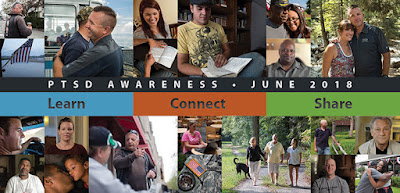Have you ever experienced an event that was so traumatic it changed your entire outlook on life? Do you ever find yourself over anxious or hyper-aroused in situations that you would have reacted differently to prior to the traumatic event? If so, there is a possibility that you meet the criteria for post-traumatic stress disorder; fortunately, there are treatments available that can help you cope with your symptoms and learn how to lead a productive life in recovery.
PTSD can come about from any one of many traumatic events. While society most closely associates the condition with people who have seen combat, any distressing event can result in the disease developing. In fact, the disorder is quite common amongst those who have had near-death experiences or were the victims of sexual or physical assault. It is unclear why some individuals develop the condition; however, once the problem arises the signs are relatively consistent from one patient to the next. There are four symptoms of PTSD which include: reliving the event (also called re-experiencing symptoms), avoiding situations that remind you of the event, negative changes in beliefs and feelings, and feeling keyed up (also called hyperarousal).
Those who experience the above symptoms find simple tasks daunting; the condition (untreated) makes it nearly impossible for individuals to hold down a job and maintain meaningful relationships. A person living with PTSD is at significant risk of developing other mental health conditions, including but not limited to, alcohol and substance use disorder.
PTSD Awareness Month
June is PTSD Awareness Month; the National Center for PTSD asks that everyone play a role in educating themselves, and others, about this severe form of mental illness. The goal throughout the month is to encourage as many people as possible to seek help if they exhibit signs of PTSD.
It can be easy to think that you are all alone with your mental illness; psychological disorders are isolating in nature, they can cut you off from the very people you rely on in life. Please understand that if you suffer from PTSD, you are not alone. In fact, PTSD can touch the lives of anyone; the condition is in no way a weakness. Around 6 of every ten men (or 60%) and 5 of every ten women (or 50%) experience at least one trauma in their lives.
The National Center for PTSD states that the kinds of trauma females are most likely to experience are sexual assault and child sexual abuse; whereas, accidents, physical assault, combat, disaster, or witnessing death or injury are more likely to affect males. About 8 million adults have PTSD during a given year. About 10 of every 100 women and about 4 of every 100 men develop PTSD sometime in their lives.
When a person deals with the symptoms of PTSD and doesn’t seek treatment, they are prone to look for ways to cope. One of the most common ways individuals contend with the debilitating symptoms of any mental illness is to self-medicate with drugs and alcohol; the practice is both dangerous and often causes a person to develop a co-occurring alcohol or substance use disorder. Paradoxically, attempting to cope with drugs and alcohol almost always makes the symptoms worse.
Addiction Treatment
PTSD Awareness Month is a perfect opportunity to address post-traumatic stress disorder and a co-occurring alcohol or substance use disorder, please contact Hope by the Sea. Please let us help you break the cycle of mental illness and begin the journey of recovery.


